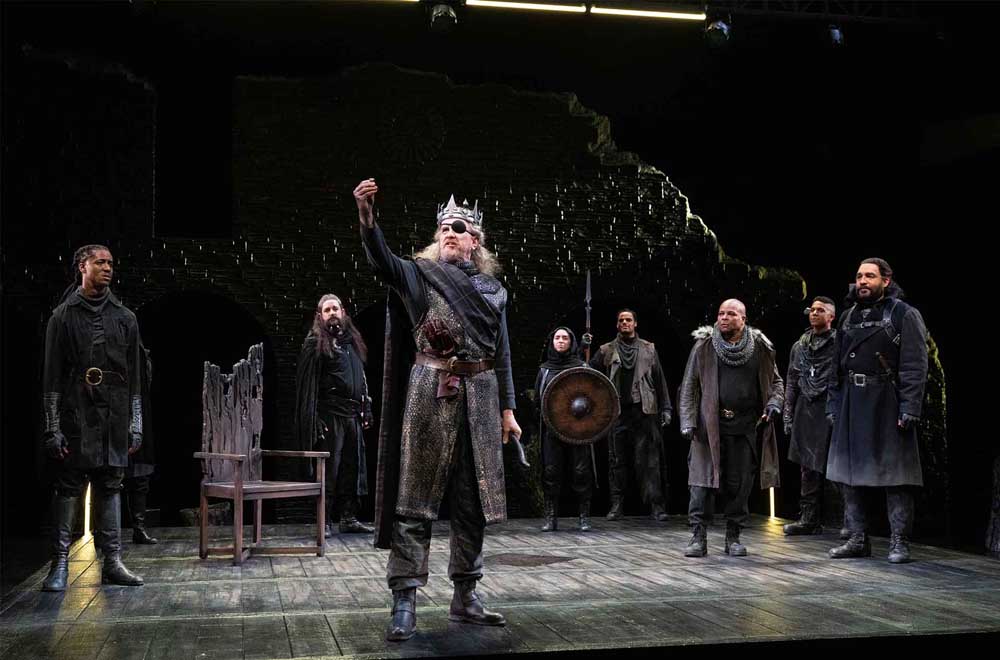THEATER REVIEW: OSF’s ‘Macbeth’
Published 6:00 am Thursday, July 11, 2024

- David Kelly, center, plays King Duncan in Oregon Shakespeare Festival's dramatic staging of "Macbeth."
Knock, knock. / Who’s there? / Macbeth. / Did you say Macdeath?
Well, no, but in a manner of speaking, it might as well be. Setting aside the idea that Shakespeare may have unwittingly invented the opening to the first knock knock joke (act II, scene III), it’s probably the only thing that is funny in this dark, foreboding tale about a power-hungry king and his manipulative wife. Oregon Shakespeare Festival’s offering of “Macbeth” at the Angus Bowmer could satisfy the cravings of any Goth enthusiast and send a chill down the spines of the rest of us.
This is a story about the dark side of human nature, about hubris and ego — but also about a man who desires to be validated, and his wife whose sole purpose in life is building him up. In a 2020 interview for the BBC, Judi Dench, who quite famously played Lady Macbeth in a 1979 film, said, “I didn’t think she is a bad person; I think that she has a passion for her husband.”
We may be shocked by the amount of violence unleashed in this story, but we can also draw correlations to today’s ambitious, paranoid, megalomaniacal leaders around the globe, oppressing their people and assassinating those closest to them. And what Shakespeare knew all along, and what we are reminded of from this paradoxical tale, are Lord Acton’s 19th-century words: “Power tends to corrupt and absolute power corrupts absolutely.”
This “Macbeth,” directed by Evren Odcikin, is mesmerizing. He has coaxed a vulnerable, compromised Macbeth out of actor Kevin Kenerly. Kenerly, over his past 28 years with OSF, has made himself into just about every character imaginable.
Odcikin also knows the incredibly complicated workings of Lady Macbeth’s mind, which has contributed to making Erica Sullivan’s portrayal of her so real. Sullivan becomes the she-devil of Lady Macbeths, cunning, ambitious and a little bit crazy, which makes for a very interesting study.
Lady Macbeth, in soliloquy, expresses her desire to be “unsexed.” Like other Shakespeare female characters, she bemoans her station as a woman and expresses the desire to have the same freedoms that males possess. You hang around Shakespeare long enough, you begin to see the subtle and not-so-subtle messages his female characters are conveying.
“Macbeth” is set in Scotland and is based on a loosely drawn, historical account. In Shakespeare’s rendering, we have Macbeth, a valiant Scottish general, who returns from battle with a close comrade, Banquo. Macbeth is rewarded with the title “Thane of Cawdor” by the sovereign he serves, King Duncan. However, for Macbeth, this isn’t nearly enough — especially since prior to all this, he encountered three witches in Birnam Wood who foretold he would eventually be king. When King Duncan (regally played by David Kelly) announces that his heir will be his son Malcolm, Macbeth and his wife decide it’s time for the witches prophecy to be fulfilled. Macbeth, against his better judgment, murders King Duncan and seizes the throne. This initiates a karmic domino effect of murder and betrayal that supplants anything that has come before and will eventually lead back to him and his wife.
There were a number of players in this afternoon production that produced a lot of electricity. Armando McClain played Macbeth’s comrade in arms, Banquo, with such sincerity. Jaysen Wright as Macduff did the same. The three witches — played by Kate Hurster, Amy Lizardo and Brooklyn Grace Williams — were chilling with their blood-curdling, tribal cries and dissonant chants.
The stage is set as Macbeth’s dark castle, the walls of which are closing in on him and his mentally tortured wife. This becomes their prison of sorts, and they are bound to remain until the end. The lighting offers an eerie undertone. It feels as though it’s creeping around the stage looking for a way out. The lighting (Michael K. Maag) and sets (Michael Locher) give this story the gloominess it needs.
The fight choreography in this particular production seemed to be a bit too staged. It never really felt as though those who took up arms were really fighting. Maybe with a bit more energy and intensity this might have been different. It was difficult at times to understand dialog that was spoken further back on the stage. The creative team as a whole, however, has put forth another view-worthy production.
This is a tragic drama of runaway murders that takes us on its downward plunge into madness. It is unsettling, disquieting, sometimes a little bit too close to home — but riveting. Parental guidance is advised; having “blood on their hands” is quite literally conveyed in this production.
Performances of “Macbeth” at the Oregon Shakespeare Festival, 15 S. Pioneer St., Ashland, are scheduled through Oct. 12, in the Angus Bowmer Theatre. Tickets start at $35. Showtimes, ticket prices and information available at osfashland.org or at 800-219-8161. Group discounts available.






